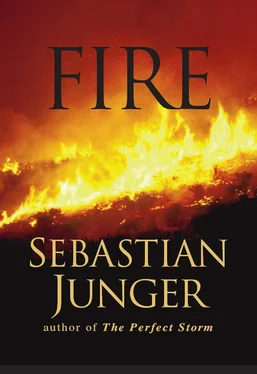Things came to a head last year when the IWC introduced a proposal to create an enormous whale sanctuary around Antarctica. The sanctuary would offer shelter to whales as the worldwide moratorium was phased out in keeping with growing whale populations. The Massachusetts-based International Wildlife Coalition, headed by Dan Morast, threatened to organize a tourist boycott against any country that voiced opposition to the proposal, and in the end only Japan voted against it. St. Vincent, Dominica, and Grenada abstained from the vote, and the South Seas Sanctuary was passed.
But the controversy over Bequia is more emotional than a vote. Ollivierre has become the focal point for dozens of environmental lobbyists, for whom everything he does is drenched in symbolism. First there was Ollivierre’s flip-flop: In 1990 he announced his retirement, but a year later he was back at it, sitting on his hilltop, looking out for whales. It was a move that angered environmentalists who thought they’d seen the last of whaling on Bequia. The reaction was compounded by Ollivierre’s efforts to sell the island of Petit Nevis, the tiny whaling station that has belonged to his family for three generations; a Japanese businessman’s offer of five million dollars was an outrage. Of course, Ollivierre’s personal impact on the humpback population is negligible. Morast’s point seems to be more conceptual: that the land sale is just another form of bribery to encourage the St. Vincent representative on the IWC to vote for whaling.
And contrary to Morast’s view, Ollivierre would love to retire. His joints ache; his vision is clouded; he’s an old man. Harpooning is dangerous, and apprentices are hard to come by. Several years ago he trained his nephew Anson Ollivierre to harpoon, but Anson branched out on his own before even bloodying his hands. Now he’s building his own whaleboat, and Ollivierre fears Anson will get his whole crew killed. So this year Ollivierre tried again, taking on Arnold Hazell. Hazell’s great-grandfather crewed for Ollivierre’s great-grandfather, and now, a hundred years later, the relationship continues. Since there are no whales to practice on, Hazell just hangs out at Ollivierre’s house, listens to the old stories, soaks up the lore.
When Hazell has killed his first whale, Ollivierre will retire. And the antiwhaling community will have a new face upon which to hang its villain’s mask.
Ashort time after meeting with Ollivierre and his crew, I drive down to Paget Farm to see about going out on the whaleboat. On the way I pass a new fish market, paid for by the Japanese government as part of a six-million-dollar aid package. According to the Japanese, it’s a no-strings-attached token of their affection for the Bequia fishermen. Past the market I turn onto a narrow cement road that grinds up a desperately steep hillside. At one end of the road is the sky; at the other end is the sea. The appointed bar is a one-story cement building halfway up the hill. I park, chock the wheels, and wander inside. It’s as clean and simple inside as out: a rough wooden counter, a half dozen chairs, no tables, a big fan. The walls are a turquoise color that fills the room with cool coral reef light. A Save the Whales poster hangs in tatters on one wall, and a monumental woman opens soft drinks behind the counter. Five men are ranged at the far end of the room. They are dressed in T-shirts and baggy pants, and one has a knife in his hand. Captain Dan, too shy to speak, just looks out the window into the midday heat. Arnold Hazell greets me with a smile and makes his pitch.
“In Bequia we don’t have much opportunity like you in the States,” he begins. “We grew up on the sea an live from the sea. Even if we don’t cotch a whale for the next ten years, it will be good just to be whalin. Just to keep the heritage up. Japanese an Norwegians—they killin whales by the thousands, an those people could afford to do something else. They have oil; they have big industry; they have a better reason to stop.” He pauses. “You know, we can put the boat out, we can talk to you, you can take snaps, but it a whole day’s work for us. We need something back.”
Luckily, I’ve been told about this ahead of time. It’s a tourist economy—the sunshine, the water, the beaches, it’s all for sale—and the whalers see no reason why they should be any different. A young man in dreadlocks steps in quietly and leans against the bar. He listens with vague amusement; he’s heard this all before.
“A few years ago a French crew come here,” says Eustace. “They come to make a film. They offer us thousands of dollars: they prepared to pay that. But we say no because we know they makin so much more on the film. Why should we work an they make all the money?”
After this statement, negotiations proceed slowly. Some careful wording, a few ambiguous phrases, and finally an agreement is reached: We’ll meet at Friendship Bay tomorrow before dawn. “And,” says Captain Dan, his eyes never wavering from the horizon, “you’ll see the Why Ask fly.”
In the distant past, most of the Caribbean islands were inhabited by the peace-loving Arawak people. Very little is known about them, because most were killed, and the rest were driven from the islands by the Caribs, whose name comes from the Arawak word for “cannibal.” Unfortunately for the Caribs, Columbus discovered their bloody little paradise within years of their ascendancy, and two hundred years later most of them were gone as well. Bequia—dry, tiny, and poor—was one of their last hideouts, and when the French finally settled here, they found people of mixed Carib-African ancestry hiding in the hills. The Africans, as it turned out, had swum ashore from a wrecked slave ship, the Palmira, in 1675.
France ceded Bequia to Britain in 1763, and inevitably the Black Caribs, as they were called, were put to work on the local sugar and cotton plantations. Only free labor could coax a profit from such poor soil, and when the British abolished slavery in 1838, Bequia’s economy fell apart. The local elite fled, and islanders reverted to farming and fishing—and eventually whaling—to survive.
The first Bequian to kill a whale was Bill Wallace, a white landowner’s son who went to sea at age fifteen and returned twenty years later with a New England bride and an armful of harpoons. As a child on Bequia he’d watched humpbacks spouting offshore during the winter months, and he didn’t see why boats couldn’t put out from the beach to kill them. Crews could keep lookout from the hilltops and then man their boats when they saw a spout. He recruited the strongest young men he could find and established the first whaling station on Friendship Bay in 1875.
There was nothing benevolent in Wallace; he was a tough old salt who was essentially out for his own gain. He’d lost his father shortly before leaving the island and had grown up in an industry that was considered brutal even by the standard of the times. Whaling crews were at sea for three or four years at a stretch, under conditions that would have made prisoners of war balk. Captains had absolute authority over their men, and there were instances of errant crew members being whipped to death. The crews themselves were no blessing, often largely composed of criminals, drunks, and fresh-faced kids just off the farm. It’s easy to guess whose habits, after four years at sea, rubbed off on whom.
The only thing that kept such an enterprise together was the unspeakable danger these men faced and the financial rewards of making it through alive. The largest whales in the world—blue whales—weigh 190 tons and measure up to one hundred feet long. They have hearts as big as oil drums and penises nine feet long. In 1839 an enraged sperm whale, immortalized by Herman Melville in Moby-Dick, attacked a three-masted ship and sank her. Harpooning such a creature could be compared with standing on a highway overpass and harpooning a truck. The line runs out through the wooden chocks so fast that it can catch fire. At that speed a kink in the line could catch a man’s arm and rip it out of the socket or make the man simply disappear from the boat. A slack line is even worse: It means the whale has sounded and is coming straight back up toward the bottom of the boat. The terror inspired by whales affected men differently. Some, mesmerized by the risks and the money, whaled until they grew old or were killed. Others jumped out of the longboats at their first sight of their foe.
Читать дальше












